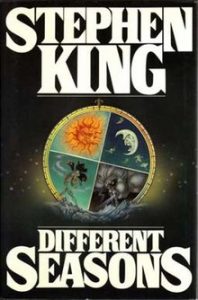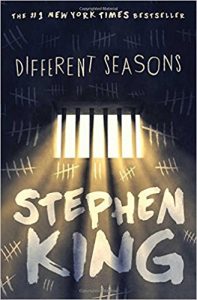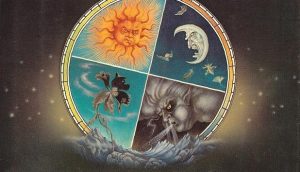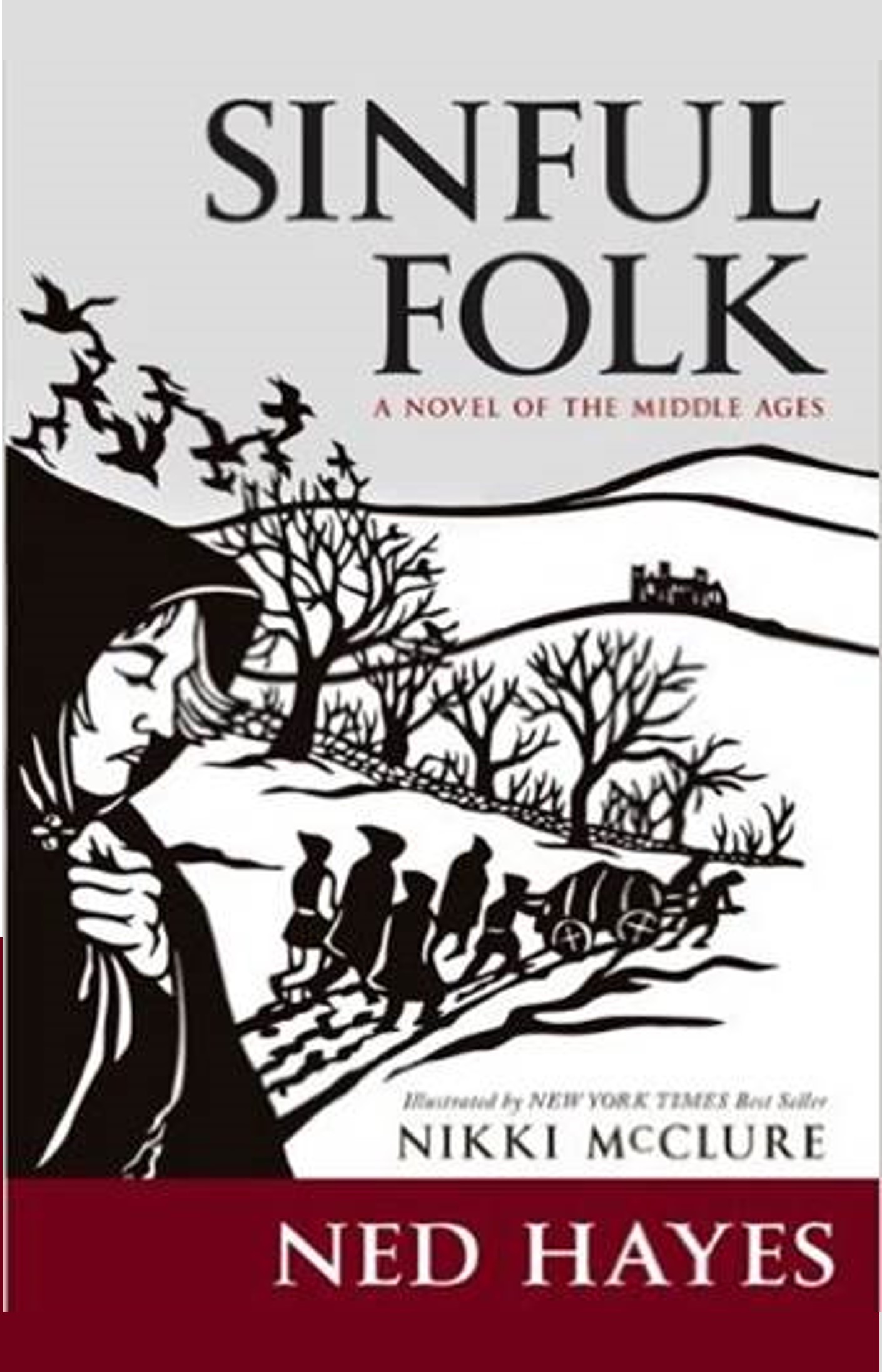 Last week, I picked up a book that’s been on my shelf for a long time. This was Different Seasons by Stephen King. This book is a collection of four novellas, and was his first publication that reached outside of the horror genre. The book includes the novellas Apt Pupil, The Body, The Shawshank Redemption and The Breathing Method (I had only read Shawshank Redemption before I picked up this book). I began reading the book purely for pleasure, and then I began asking myself about why precisely this book was pleasurable to me as a reader. This paper is about a few of the specific pleasures that I found King brings to a reader. I’m enumerating them here because I hope to duplicate these particular attributes in my own writing.
Last week, I picked up a book that’s been on my shelf for a long time. This was Different Seasons by Stephen King. This book is a collection of four novellas, and was his first publication that reached outside of the horror genre. The book includes the novellas Apt Pupil, The Body, The Shawshank Redemption and The Breathing Method (I had only read Shawshank Redemption before I picked up this book). I began reading the book purely for pleasure, and then I began asking myself about why precisely this book was pleasurable to me as a reader. This paper is about a few of the specific pleasures that I found King brings to a reader. I’m enumerating them here because I hope to duplicate these particular attributes in my own writing.
The thing about Stephen King is that he is predictable. This is not a bad thing. Setting expectations for readers is something that every writer does. We announce to readers with our titles, our writerly personas, the marketing blurbs and in our writing style (Noir? Lyrical? Journalistic? Hemingwayesque? Faulknerian?) what the reader should expect. No reader – I hope – enters into a Cormac McCarthy novel hoping to find a sweet cozy mystery or romance. No one reads romance for blood and gore. But I fear I’m alluding to genre here, when I mean to speak about an attribute of writing that I find particular to King and other writers who have gathered large and consistent audiences.
Yet what Stephen King does is so utterly consistent from book to book that his readers trust him. I knew when I picked up a Stephen King book that I would get human characters that will have a life that I recognize, and that I know as familiar in standard human terms. If behavior must be explained or illuminated for me (as a reader), Stephen King will take the time to explain the behavior until I come to understand that behavior on its own terms and recognize it. This is in stark contrast to a writer like, for example, Jonathan Franzen or Cormac McCarthy, who do not explain their characters in terms of motivation, inner life or external behavior. Their characters thus exist as ciphers to many readers. Some readers find that pleasurable: many others do not.
 However, for this reason, some readers (and notably some high-brow writers) believe that Stephen King writes “clichéd” books that contain “stereotypical” characters. This is a valid critique, but I think that all too often writers rely on originality as the prime objective, without realizing that they must ground their stories – and their readers – in the recognizable and the familiar before they take a flight of fancy into the unknown. Part of the reason so-called “dirty realism” fiction (such as that originally popularized by Raymond Carver in the MFA world) became the norm is that it starts with the recognizable, and then the originality is found in building a new perspective or a new framework around the already-known world of the truck driver, the wheat farmer, the mill worker or the down-and-out-drunk. Carver limned his characters in quick stark strokes, with a minimum number of words and descriptors. Yet there’s hardly an “original” character among them: Carver writes no Dickensian Oliver Twists or memorable Martin Chuzzlewits, and will never be known for a character like Scrooge.
However, for this reason, some readers (and notably some high-brow writers) believe that Stephen King writes “clichéd” books that contain “stereotypical” characters. This is a valid critique, but I think that all too often writers rely on originality as the prime objective, without realizing that they must ground their stories – and their readers – in the recognizable and the familiar before they take a flight of fancy into the unknown. Part of the reason so-called “dirty realism” fiction (such as that originally popularized by Raymond Carver in the MFA world) became the norm is that it starts with the recognizable, and then the originality is found in building a new perspective or a new framework around the already-known world of the truck driver, the wheat farmer, the mill worker or the down-and-out-drunk. Carver limned his characters in quick stark strokes, with a minimum number of words and descriptors. Yet there’s hardly an “original” character among them: Carver writes no Dickensian Oliver Twists or memorable Martin Chuzzlewits, and will never be known for a character like Scrooge.
In the way he writes characters, King is like a low-brow John Irving, painting characters vividly so that they stay in your memory. Yet unlike Irving, King does not create caricatures or characters who are memorable for specific traits, behaviors, attitudes or presence in the world. There are no transgender football players, pet bears, or horrific sex accidents in King (cf. Irving’s World According to Garp). King may describe a character with many more words than Carver, yet in the end they are both writing about an “average” mill worker, or police man or homemaker. Both Carver and King start with the average, the norm, and establish that firmly in order to describe what happens to these average characters.
Consider the novella “Apt Pupil” in Different Seasons. In this novella, a young boy is drawn to an older Nazi, and gradually “learns” from him how to be a serial killer and how to discard human lives like leaves. What is really interesting about this story is that I thought I knew the basic plot going in. Old Nazi would entice young boy in a pedophile-like embrace, and gradually things would go to hell. King didn’t write it that way at all. Instead, in the words of one of the main characters, he wrote:
[T]he story of an old man who was afraid… of a certain young boy was, in a queer way, his friend. A smart boy… At first, the boy was not the old man’s friend… At first, the old man disliked the boy a great deal. Then he grew to… to enjoy his company, although there was still a strong element of dislike there […] Part of the old man’s enjoyment came from a feeling of equality… You see, the boy and the old man had each other in mutual deathgrips. Each knew something the other wanted kept secret. (King 191-192)
King’s brilliance here is to make the old Nazi a vulnerable, afraid human being. When a young boy reaches out to him with a threat, they gradually become equals in terms of terror and secrets. I did not expect this at all, and the story entranced me because of the unique approach King took to a story that could have been quite hackneyed. What I meant earlier by “predictability” should instead be characterized as “fully fleshing” his characters. I know that there will be no easy-to-categorize “evil” human beings. Instead, there will be human beings who are flawed and trying to do their best with what they have to work with. He fleshes his people, which is harder to do than it looks.
 The other thing that I find intensely “comfortable” about King is that events have moral weight in his novels. Let me explain this point by reference first to Bret Easton Ellis – a writer who I believe avoids moral justice like the plague. Ellis might disagree with this point, and in fact, he often portrays his novels as parodies or satires of moral immorality. Yet at heart, I really think satire is a genre without moral justice – or in mockery of moral justice. Ellis’s characters get away with hell on earth – both in their behavior to other people as well as their behavior to themselves. They don’t live lives that are considered or meaningful, because their actions have no consequence and no moral weight.
The other thing that I find intensely “comfortable” about King is that events have moral weight in his novels. Let me explain this point by reference first to Bret Easton Ellis – a writer who I believe avoids moral justice like the plague. Ellis might disagree with this point, and in fact, he often portrays his novels as parodies or satires of moral immorality. Yet at heart, I really think satire is a genre without moral justice – or in mockery of moral justice. Ellis’s characters get away with hell on earth – both in their behavior to other people as well as their behavior to themselves. They don’t live lives that are considered or meaningful, because their actions have no consequence and no moral weight.
King, on the other hand, even if everything is going to hell – and especially when very bad things are happening – manages to carry his readers through by making an implicit promise that the bad will be accounted for, and that the good (on some level) will triumph. Bad actions have consequence in King, even if they are (as in “The Body”) momentarily avoided. In the end, those who commit crimes are always discovered by themselves or others, and must pay for their actions. And those who quietly do well are discovered in a different way, and rewarded. King is the contemporary writer who most honestly embodies Tolkien’s famous aphorism that it is “the small everyday deeds of ordinary folk that keep the darkness at bay… small acts of kindness, and love” that ultimately defeat evil (Jackson / Tolkien). King adheres to this maxim, almost to a fault. There are no magical mages in King, and very few people with special powers (none that I can think of who understand or control their powers purely for good). There are no melodramatic good guys, and very few purely evil characters. Instead, there is an Everyman or Everywoman who has to struggle with the laundry, self-esteem issues, and their upset spouse, all while struggling with unimaginable forces from the beyond. They are small everyday deeds that ultimately keep the dark at bay. And it is telling that even in these everyday lives, King manages to keep the moral compass clear. In contrast to many other contemporary writers – both literary writers like Paul Auster and commercial writers like Scott Turow – King ensures that we can trust him to bring a moral gravity to his work that is hard to do well, and trite if you don’t pull it off well.
I read King still when I just need some moments of pleasure, because I can trust him to be predictable in terms of his human characters and I trust the moral weight of his books. I’d like to be a writer who is as successful in these two attributes as King has been: even if I never have a Stephen King like commercial success. I think that these two attributes will stand the test of time.

A literary update from NedNote.com
Readers can find my books at these bookstores:
Works Cited
King, Stephen. Different Seasons. New York: Signet, 1983.
The Hobbit: The Unexpected Journey. Dir. Peter Jackson. Warner Bros, 2012. Film.





